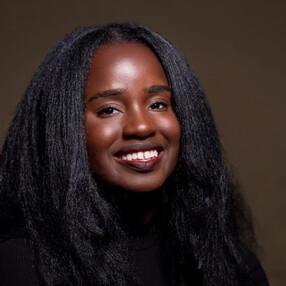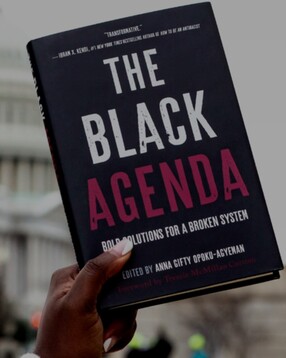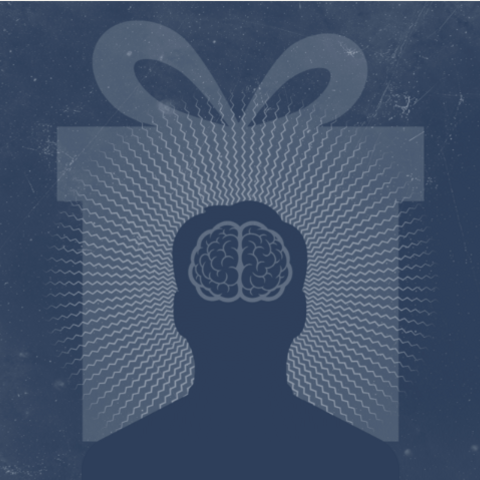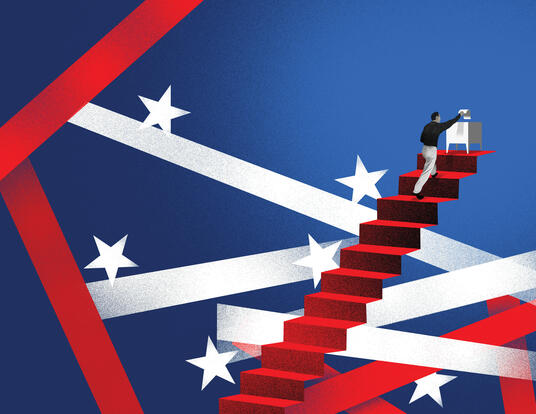Colloquy Podcast: The Black Agenda

The Black Agenda is a new collection of essays that centers the voices of Black experts—particularly women. Whether the issue is climate change, public health, economic inequality, or education, the contributors to The Black Agenda see social and racial justice as integral—not supplemental—to solutions. Along the way, the book interrogates our assumptions about the ways we live and work together in the United States, as well as our notions of where to look for answers.
Joining us to discuss The Black Agenda is editor Anna Gifty Opoku-Agyeman, a PhD student in public policy at the Graduate School of Arts and Sciences. Gifty Opoku-Agyeman is the co-founder of The Sadie Collective, a nonprofit organization that addresses the underrepresentation of Black women in economics, finance, and policy. Her advocacy, research, and commentary have been featured by Bloomberg, NPR, Teen Vogue, Slate, and The New York Times. She is the youngest recipient of a Women's Rights Award from the United Nations Convention on the Elimination of All Forms of Discrimination Against Women.
Note: This transcript has been edited for clarity.
So, what is The Black Agenda? Both the larger concept and how it's represented in this collection of essays?
Yeah, I love that question for a number of different reasons. So, The Black Agenda is really a set of items that need to be accomplished that ultimately honor the humanity of Black people and the communities that Black people are part of.
And so, the way that this book reflects that is that I've taken a very, very small slice of the expertise that's represented in the Black community and said, look, you all have been generating the evidence, asking these really critical research questions about the Black community for years. How about we put you at the center of the stage and ask you to base solutions off of the evidence that you've generated and also drawing on your lived experience and how that informs and contextualizes the work that you've been doing for such a long time?
Before we get into the ideas presented in the book, can you talk about the authors? You had a very intentional approach to whom you included and how you thought of expertise.
I looked at expertise in a very broad lens, though obviously many of the individuals who are featured in the book are PhD holders or have gone to graduate school. So, I want to first and foremost say that expertise is not limited by whether or not you go to graduate school. And so that's why you have quite a few folks who are not necessarily graduates of higher education, but rather are advocates and activists who have been doing the work for quite some time.

And so, expertise here is anybody who has a vested interest in a particular issue and has been advocating through either research or their own form of advocacy towards solutions that address that issue. And so, to your point about being very intentional about the folks who are included in this agenda—or in this book, rather—I really want to hit on a couple different things.
First and foremost, there was a huge wave of support for listening to Black women shortly after the Georgia runoff elections. Stacey Abrams, Ms. LaTosha Brown, and several Black women on the ground in Georgia were instrumental to Georgia turning blue. And so, there was this huge wave online that we should listen to Black women.
And so, I took that to heart. I said, if we're going to have a policy book, then let's actually have it oriented towards Black women and people who are part of the LGBTQ+ community. So that was the first thing that I really wanted to intend.
The other thing was that Black expertise is not just limited to whether or not you are seasoned in that space. A lot of times, young folks have quite a bit to say. And so, if you look at the book, there's actually a mixture of younger and older voices that are peppered throughout to kind of give you a multigenerational approach to some of these problems that have existed for generations. So, for example, the climate chapter starts off with a very seasoned climate scientist, Dr. Marshall Shepherd, but it ends with a non-binary creative that is currently getting into the space themselves.
And so, they're on the younger side, but you're still getting another perspective of issues that are highlighted throughout that entire chapter. So, for me, I looked at The Black Agenda book as an opportunity to highlight voices that oftentimes are doubly marginalized in the discourse, but also don't have opportunities to actually say what's on their minds and to project their ideas.
And so, if I have a book like this that exists, then let me go ahead and actually use this platform to highlight folks who are unheard of or just marginally heard of depending on the spaces that they inhabit.
I looked at The Black Agenda book as an opportunity to highlight voices that oftentimes are doubly marginalized in the discourse, but also don't have opportunities to actually say what's on their minds and to project their ideas.
OK, let's talk about some of the challenges addressed in the book. There's an essay on the importance of intersectionality in addressing climate change. How do racial justice and environmentalism go hand in hand?
On the climate chapter, what I love about that chapter is that essay in particular, too. It's by Abigail Thomas and it talks about intersectional environmentalism, which is something that took off basically during the summer of 2020. It was co-founded as an organization by Leah Thomas, who was actually a good friend of mine, along with her co-founders, Diandra Miandra and the Intersectional Environmentalist Council. Like, a number of them are on the co-founding team.
And so essentially what I love about her essay, she ties the climate justice movement, which I think many of us are not familiar with, this idea of disproportionate impacts on Black and brown communities, depending on where you live, as it relates to climate.
And actually, what's lovely about this chapter is that you get that broad overview from Dr. Marshall Shepard's essay at the very beginning where he talks about the climate weather gap saying, look, where Black people live or where Black and brown people live actually really matters in terms of how hot their neighborhoods are, what kind of waste plants they're near, et cetera.
And so, Abigail basically just builds on that and says, look, let me take it one step further. What's happening with the criminal justice system is directly tied to the climate justice--climate justice movement, excuse me, where she talks about how—for example, this statistic blew my mind. She said 589 or more federal and state prisons are within three miles of a hazardous commercial waste site, also known as Superfund dump sites.
So, imagine folks who are incarcerated going outside, having to do either—that's the only time that they have fresh air or they're doing some sort of labor for the prison, and that being right next to an environmentally toxic waste site. No one wants to live near that. So why are we treating people that way?
And then when you add on what context the criminal justice chapter adds to the criminal justice system around race and how it intersects with gender and gender identity, we know for a fact that the majority of folks who are incarcerated are Black and brown. So, then you think about how race is playing a role in how folks who are next to environmentally toxic sites are oftentimes those who are suffering the most or amongst the most marginalized.
And so, I love her essay because she talks about how intersectional environmentalism is a holistic perspective that advocates for environmental protection, including the dismantling of oppressive social, economic, and political systems that perpetuate harm. And that is something that seems unique to environmentalism, but then when you go to any other chapter in the book, that exact theme comes up again and again. You can replace environmentalism with health care, with education, with the economy, with public policy. And I think for me, that was the biggest takeaway from the book.
Recently I got to read the book as a reader and not as an editor, and what I realized was that everybody is basically operating from the same context. Black people are being harmed disproportionately, and we need to do something about it, because ultimately what happens to Black people is a precursor to what happens to everybody else. And you definitely see that in the economy chapter when they talked about the financial crisis and how policies that are surrounding the economic situation in America is usually a precursor to what's going to happen with everybody else. So, I think for me, that's one of the clearest examples of how this book has built on community in terms of bringing the evidence, but also bringing in the lived experience that's necessary to understand a problem and also build on solutions.
One of the most powerful essays in the book is the one entitled, "Algorithmic Assault." Talk about the ways in which artificial intelligence often has a negative impact on people of color, for instance, with facial recognition technology.

Dr. Brandeis Marshall's essay, "Algorithmic Assault," in my opinion, a couple of things: It's actually not talking to all readers, one. It's a book that—sorry, it's an essay that everyone should read, but if you really look at the essay, she's talking to Black people in particular. She's saying, look, these systems are coming regardless of whether or not you want them to and they're already here in some ways.
And so, the harms that are perpetuated through these systems, we have to come up with some level of tools to be able to combat them, and we have to also come up with some level of language to be able to understand them so that we can combat them. And so, in her essay, she talks about how AI has already perpetuated harm in low-income and working-class Black and brown communities.
And so, she talks about, for example, folks being incorrectly profiled as criminals because the only training data that's being used about Black people is coming from some sort of criminal database or is being coded in a way that views Black and brown people as harmful inherently.
And that's also dependent on who's actually in the room loading up this trading data. And that's why it's not about just getting Black and brown faces into the room, but also ensuring that the systems that are housing how we're thinking about the technological revolution are also reflecting the diversity of individuals in the room as well.
And so, with that being said, she also mentions the fact that AI is something that has already harmed communities, and the harm is just exponential. It's like, whatever you thought was bad, times it by 10. And so, we can't approach these problems the same way we approach other racial inequity problems, because she says death by 1,000 data points. Like, that's essentially where we're at.
And then the other thing that I really thought was very solemn but a very poignant point, when she was talking about how in the digital age, we're also able to capture Black pain in real-time. If you think about trending topics around Black folks who were murdered by the police, for example, you get to see that over time through these different websites like Twitter or Facebook, or Instagram.
And so, I love her essay, because at the end of the day, what she's really advocating for is that Black people be better equipped to handle what the technological revolution is inevitably bringing, which is death by 1,000 data points at our expense. While some people might get lots of really cool jobs out of this, ultimately our communities are going to be harmed by what ends up happening with data and data science as it evolves.
And so, I love her essay because it's a warning, but it's also a promise. Like, this is definitely going to happen, so we absolutely need to be equipped to handle what's coming.
In another chapter, Kyle K. Moore, who's an economist at the Economic Policy Institute, critiques both neoclassical economics and Marxian economics from a racial justice framework. Your academic work is in public policy and economics. What's Moore's critique and the framework of stratification economics that he offers as an alternative?
So, the way I understand neoclassical economics is that it's ultimately about maximizing your utility. And it looks at it at a very individual level. And I think where it differs from non-neoclassical economics, things like stratification economics or heterodox economics, is the role those structural elements play in driving that maximizing of utility.
So, what I mean by this is that, for example, Kyle talks about how a lot of neoclassical economists will point to the disparities across race and gender to educational and skills gaps at the individual level. They'll say, look, this individual person is not pursuing their education, and that's why there's this gap in their labor market outcomes.
If divestment happens in Black communities, then the quality of education in those communities from a very young age is already embedded into their experience in the labor market. So then how do you account for those differences without talking about the structures that created them to be that way?
And for those who are like, what did she just say? All I'm saying is that basically, your inability to go to school is affecting why you don't have a job. That's essentially what I'm saying there. And what Kyle and a lot of stratification economists such as William Sandy Darity, who's actually the last essay in the book—excuse me, Derek Hamilton, who is very well known amongst Progressive circles, are saying is that “Sure. But also no.” There are structural components that play a huge, huge hand and how those opportunities are even administered in the first place. So, if you think about, OK, the gap in higher education is due to education and skills. Well, if divestment happens in Black communities, then the quality of education in those communities from a very young age is already embedded into their experience in the labor market. So then how do you account for those differences without talking about the structures that created them to be that way?
And so, I think that is the distinction between how stratification economists think about racial inequity and its role in the economy versus folks who maybe subscribe more so to the market side of things, the neoclassical side of things. And I would say, look, it's not night and day. There are neoclassical economists that subscribe to some elements of stratification economics, excuse me, and vice versa.
But I think ultimately, what Kyle is getting out in this essay is that it's not enough to just say that what is happening at a structural level boils down to individual decisions. That's just not true. And I think that what we're also realizing in the mainstream, there's increasing conversation around this that racism is a structural problem. It's about power, it's about wealth, it's about whiteness, how those things intersect, and how those things prevent opportunities for people from different groups.
That is what we're talking about here. And I think that what Kyle is saying is that economists need to consider that structural component a bit more in how they analyze topics around race.
There's obviously an astonishing breadth of topics addressed in this book. Throughout all of them, the issue that comes up again and again is the carceral system in the United States. The Civil Rights lawyer, Tahir Duckett, addresses the topic head-on in his essay, "The Carceral System Has No Future." Can you talk about the criminal justice thread that runs through The Black Agenda?
Until you mentioned it, I didn't realize that it came up in almost every chapter, if not every chapter. You're very right. The truth is the criminal justice problem is bad. And the solutions are varied. And I love the chapter for that reason. Because Black experts are not coming at this issue as a monolith.
The overarching idea is, we don't want Black people to be criminalized for just existing. That's the overarching idea. But the way in which people want to approach that idea differs. One essay talks about how we should diversify the police officer force and then we should add more automated systems, but then if you think about those automated systems, maybe someone like Dr. Brandeis Marshall, Deb Raji might say, wait a minute, but those automated systems might be biased in and of themselves. And how does that, then, tie to economic opportunities? You see what I'm saying? And then if you think about also the Tahir Duckett essay, he's like, get rid of it. The whole thing is trash. We need to start over. And from that saying, he's not saying get rid of police and get rid of any enforcement that can ensure our safety, he's saying, divest. Invest in other ways to get Black people what they need, get Black and Brown folks what they need since are disproportionately being criminalized.
And he says wait, go invest in mental health, which alludes to Jevay Grooms' chapter where she says mental health for Black America is imperative, especially since so many Black men are incarcerated. And then you tie that back to Dr. Hedwig Lee's essay where she talks about how the conversation around incarceration has largely focused around Black men, what about Black women and their children? And the folks who actually have to bear the literal cost of Black men not being there. That is also a perspective that is absolutely necessary.
And it also ties into Preston Mitchum's essay around the LGBTQ+ community being overpoliced. Especially when you intersect that with race. So, I think ultimately to say, what I love about this chapter is that it's straight-up facts. And I think that a lot of times when people are talking about the criminal justice system, talking about what's happening with police, et cetera, people are talking in hypotheticals. This makes me feel bad.
But I feel this. The facts are very clear. The situation is incredibly bad for Black people. And so, the solutions in this chapter need to be taken with the utmost seriousness, because at this point, me being Black is a crime. That is unacceptable. And I think everybody can agree, it shouldn't be a crime for you to exist.
OK. Once we have that level of agreement, now let's talk about some of the solutions. And so that's what this chapter does, in my opinion, very, very eloquently, and it harks back to other chapters in the book that also talk about it in the context of their respective discipline.
As you put this book out into the world, how do you envision the ideas and policy prescriptions being enacted given the state of our civic life?
I think what I love about this book is that all the solutions are very practical. You'll find yourself reading this book and being like, hmm, why aren't we already doing this? So a really good essay I like to point to around this kind of thinking is the disability activist Tinu [Abayomi-Paul] talks about how improving conditions and incentivizing businesses to accommodate folks who are disabled.
And when you think about it, it's like, why isn't this already happening? She talks about how if we are aiming to help folks who are disabled, everybody's workplace conditions improve. For example, some people are very lazy, they don't like to take the steps. So, they go up ramps. But ramps were created with disabled people in mind.
The solutions that are helping Black people ultimately help everyone. And that's why Black folks, especially Black experts, need to be at the center of the conversation.
So that's a really good example of something that benefits you, but it didn't have you in mind, actually. And so, I think that the way to look at this entire collection of essays is that all of these solutions are ultimately aimed at uplifting Black America, in my opinion, within the diaspora of Black folks. Black Americans have suffered a plight that, in my opinion, is unparalleled.
And so, if we are aiming solutions at Black Americans, everybody, literally everybody benefits. And so, if we are coming up with solutions that then undo that construction, ultimately the best outcome for Black Americans, especially Black American women, is a better outcome for literally everybody else. And I think that's the big takeaway from this. That the solutions here are not just targeted at Black people and Black people alone, but they're targeted at everyone. If we are helping Black workers, then we're helping workers by default. If we are helping to diversify health care, that means that your white child has the opportunity to be administered to by a Black doctor and that Black doctor is going to do a great job.
This idea of centering Black girls in the classroom and making sure that young people feel humanized when they get to the class, that is something that is universal.
So, I think that's the biggest thing here. Black people are human. That's the case that we're making here. The evidence supports that fact. That's just what it is. Some people need that evidence. And more importantly, the solutions that are helping Black people ultimately help everyone. And that's why Black folks, especially Black experts, need to be at the center of the conversation.
Photos courtesy of Anna Gifty Opoku-Agyeman
The Colloquy podcast is a conversation with scholars and thinkers from Harvard's PhD community on some of the most pressing challenges of our time—from global health to climate change, growth and development, the future of AI, and many others.
About the Show
Produced by GSAS Communications in collaboration with Harvard's Media Production Center, the Colloquy podcast continues and adds to the conversations found in Colloquy magazine. New episodes drop each month during the fall and spring terms.
Talk to Us
Have a comment or suggestion for a future episode of Colloquy? Drop us a line at gsaspod@fas.harvard.edu. And if you enjoy the program, please be sure to rate it on your preferred podcast platform so that others may find it as well.
Get the Latest Updates
Join Our Newsletter
Subscribe to Colloquy Podcast
Simplecast





